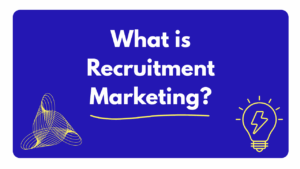In today’s ever shifting job market, simply posting a job opening and hoping for the best is no longer sufficient to attract top talent. Enter Recruitment Marketing – a strategic, proactive approach that leverages marketing principles to identify, attract, engage, and nurture potential candidates, even before a specific role opens. It’s about building your company’s reputation as an employer of choice and cultivating a strong talent pipeline.
 Let’s elaborate on that crucial foundational section to give an even clearer picture of what recruitment marketing truly entails:
Let’s elaborate on that crucial foundational section to give an even clearer picture of what recruitment marketing truly entails:
Understanding Recruitment Marketing: More Than Just Hiring
At its core, recruitment marketing is akin to traditional product marketing, but instead of selling a product, you’re “selling” your company as an ideal workplace. Think of it this way: just as a company markets a new smartphone to potential customers by highlighting its features, benefits, and how it solves a problem, recruitment marketing highlights the unique Employer Value Proposition (EVP) of your company.
You’re showcasing your culture, values, career growth opportunities, benefits, and the impact employees can make. It’s about demonstrating why someone should choose to invest their skills and time with your organization over a competitor. You’re identifying your “target audience” (ideal candidates), understanding their “needs” (career aspirations, work-life balance, compensation), and crafting compelling “messages” to attract them.
It focuses on the “pre-applicant” phase of talent acquisition, building awareness and interest among both active job seekers and passive candidates (those not actively looking but open to new opportunities). This is a critical distinction. Traditional recruiting often kicks in after someone has decided they want a new job and starts looking. Recruitment marketing, however, operates much earlier in the candidate journey. It’s about planting seeds long before a specific vacancy arises.
For active job seekers, this means ensuring your company is top-of-mind when they do start their search. Your career site, social media presence, and online reputation become essential resources they consult.
For passive candidates, this “pre-applicant” phase is even more vital. These are individuals who are currently employed and performing well, not actively Browse job boards. To reach them, recruitment marketing engages them through compelling content (e.g., employee spotlight videos, thought leadership articles from your team, insights into your innovative projects), targeted social media campaigns, and building talent communities. The goal isn’t to get them to apply today, but to foster a relationship and make them aware of your company as a desirable place to work, so when they are ready for a change, your organization is the first one they think of. It’s about cultivating a warm pipeline of talent, rather than scrambling to find candidates when a critical role opens up.
It’s distinct from employer branding, though closely related. Think of it like this: Employer Branding is about defining your company’s identity and reputation as an employer. It’s the core essence of what your company stands for internally, how employees experience working there, and how that is perceived by the outside world. It’s your company’s unique “DNA” as a workplace.
Recruitment Marketing, on the other hand, is the external work you do to promote that brand and engage candidates. If employer branding is the blueprint for your dream home (what makes it unique and desirable), recruitment marketing is the process of showcasing that blueprint, holding open houses, running ads, and talking to potential buyers to get them excited about moving in. It’s the actions, campaigns, and content that bring your employer brand to life and put it in front of the right people at the right time to actively attract and nurture them towards becoming applicants. One defines the message, the other delivers it.
Key Aspects of Recruitment Marketing
Recruitment marketing encompasses several interconnected components:
- Employer Branding: Consistently communicating your company’s mission, values, culture, and benefits across all touchpoints. This shapes how potential candidates view your organization.
- Content Creation: Developing engaging content that tells your company’s story. This includes blog posts, videos, employee testimonials, infographics, and more, showcasing what it’s like to work for you.
- Targeted Advertising: Using data-driven techniques to deliver personalized job ads and employer brand messages to specific audiences on platforms where they spend their time. For example if a large portion of your candidates are on Facebook you might consider an ad campaign there.
- Candidate Engagement: Fostering meaningful interactions with potential candidates throughout their journey, from initial awareness to application and beyond. This involves consistent communication, valuable experiences, and timely feedback.
- Data and Analytics: Tracking key metrics to measure the effectiveness of your strategies. This data helps identify what’s working, what’s not, and how to optimize your efforts for better ROI.
Typical Recruitment Marketing Tasks
Implementing a successful recruitment marketing strategy requires a proactive and sustained effort from employers. Here are the keys tasks to focus on:
- Defining Your Employer Value Proposition (EVP): Clearly articulating the unique benefits and opportunities your company offers employees.
- Creating Candidate Personas: Developing detailed profiles of your ideal candidates, including their skills, experience, career goals, and preferred communication channels. This helps tailor your messaging.
- Optimizing Your Career Site: Ensuring your company’s career page is mobile-friendly, easy to navigate, features compelling content, and has a clear call to action. It’s often the first stop for interested candidates.
- Leveraging Social Media: Actively showcasing your company culture, sharing employee stories, and promoting job openings on platforms like LinkedIn, Facebook, and Instagram.
- Implementing Content Marketing: Regularly publishing and distributing engaging content across various channels to educate, entertain, and inspire potential candidates.
- Building Talent Communities: Creating a space (e.g., through newsletters, webinars, or dedicated platforms) where interested individuals can stay engaged with your company even if they’re not ready to apply immediately.
- Developing Employee Referral Programs: Encouraging and incentivizing current employees to refer qualified candidates, as referred hires often have higher retention rates.
- Monitoring Online Reviews: Actively managing and responding to reviews on sites like Glassdoor and Indeed to maintain a positive employer reputation.
- Utilizing Recruitment Analytics: Tracking metrics such as career site visitors, application rates, conversion rates, and time-to-fill to continuously refine your strategy.
Best Practices in Recruitment Marketing
To stand out and attract the best talent, consider these best practices:
- Be Authentic and Transparent: Showcase your true company culture, warts and all. Authenticity builds trust.
- Prioritize the Candidate Experience: Make every interaction a positive one, from the initial touchpoint to the application process. A seamless and responsive experience is crucial. Audit your existing process and look for ways to streamline.
- Embrace Storytelling: Use narratives, especially from current employees, to bring your employer brand to life and make it relatable.
- Leverage Video Content: Video is highly engaging and can convey your company culture and employee experiences more effectively than text alone.
- Go Beyond Job Boards: While essential, integrate diverse channels like social media, email campaigns, recruitment events, and targeted digital advertising to reach a broader audience, including passive candidates.
- Utilize Data-Driven Decisions: Continuously analyze your recruitment marketing data to understand what’s performing well and optimize your campaigns for maximum impact and ROI.
- Collaborate Cross-functionally: Ensure alignment and consistent messaging by working closely with HR, marketing, and leadership teams.
- Think Long-Term: Recruitment marketing is not about quick fixes; it’s about building lasting relationships and a sustainable talent pipeline.
How Jobsync Helps Your Recruitment Marketing Efforts
Jobsync is designed to empower companies to streamline and enhance their recruitment marketing efforts. By providing tools to manage job postings, optimize career pages, and potentially integrate with various marketing channels, Jobsync can help you:
- Centralize Your Job Postings: Easily manage and distribute job openings across multiple platforms, ensuring wider reach and consistent branding.
- Enhance Your Candidate Experience: Our own career site platform can wrap your jobs and create a seamless application process that reflects positively on your employer brand.
- Improve Efficiency: Automate repetitive tasks in your recruitment marketing workflow, allowing your team to focus on strategic initiatives and candidate engagement.
By leveraging a platform like Jobsync, employers can effectively implement recruitment marketing strategies, attracting higher quality candidates and building a strong foundation for future hiring success.
Ready to transform your recruitment marketing? Click here for a demo.


